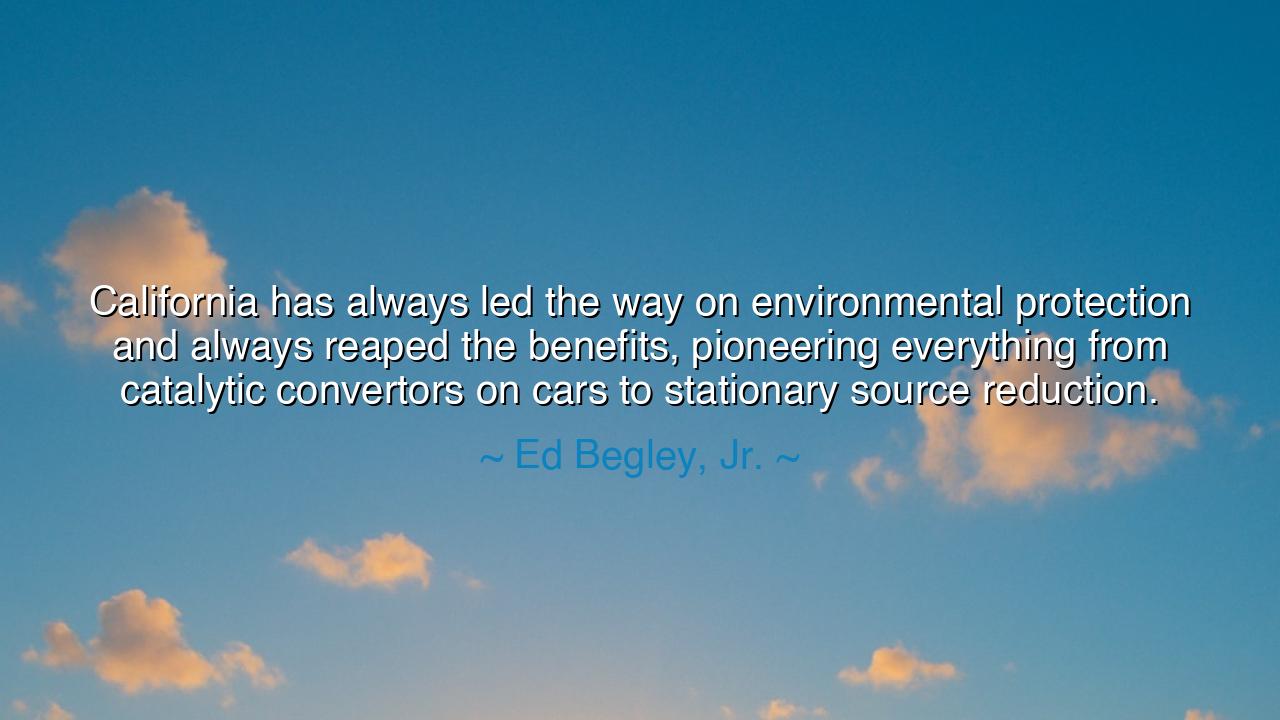
California has always led the way on environmental protection and
California has always led the way on environmental protection and always reaped the benefits, pioneering everything from catalytic convertors on cars to stationary source reduction.






The words of Ed Begley, Jr.—“California has always led the way on environmental protection and always reaped the benefits, pioneering everything from catalytic convertors on cars to stationary source reduction.”—are both a tribute and a reminder. They honor a land that has dared to innovate, a people who have chosen foresight over convenience, and a history where environmental stewardship has not been an afterthought, but a cornerstone of progress. Yet beneath his pride lies a deeper truth: that the work of preservation is not finished, that the path of leadership is one that must be walked anew by every generation. For Begley, these words are not only about California, but about the human spirit—its power to heal what it has harmed and to guide the world toward harmony with the Earth once more.
The origin of this quote springs from Begley’s lifelong devotion to environmental advocacy. As an actor, he used his fame not for indulgence, but for influence—transforming his home, his life, and his career into living testaments to sustainability. His admiration for California’s leadership is not abstract patriotism; it is the gratitude of one who has seen his homeland turn from smog-choked skies to clearer horizons through courage and invention. The catalytic converter, which California first mandated in the 1970s to cleanse the poisonous exhaust of automobiles, stands as a symbol of this courage. It was not an easy law; industries resisted, politicians hesitated. Yet California held firm—and the world followed. What was once radical became normal, and what was once costly became salvation.
To the ancients, such progress would have been seen not merely as technological, but moral. For they knew that a civilization’s greatness was measured not by the towers it built, but by how it treated the earth that bore it. The philosopher Plato warned that a city that poisons its own rivers cannot endure; the poet Virgil wrote that the land gives back only what is sown in reverence. In this spirit, Begley’s praise for California’s pioneering work is not flattery—it is recognition of a moral awakening, a state learning to align human ingenuity with natural law.
Consider the story of Los Angeles in the mid-20th century, when the city lay shrouded in smog so thick that children stayed indoors and the mountains vanished from view. The air was unbreathable, the sunlight dimmed. Yet from that suffering came a movement: scientists, citizens, and lawmakers uniting to confront the crisis. Out of that crucible was born the California Air Resources Board, the first of its kind, which led to innovations like emissions standards and cleaner fuels. The transformation was not immediate, but it was real. Decades later, the air cleared, and what was once a symbol of pollution became a model of resilience.
Begley’s reference to stationary source reduction—the regulation of factories, refineries, and power plants—extends this story beyond cars and cities. It is a recognition that every source of pollution, whether mobile or fixed, must be met with equal resolve. In the ancient world, when fire burned too fiercely, it consumed its maker. So it is with industry: the same fire that powers civilization must be governed with wisdom, lest it consume the very life it was meant to serve. California, in this way, stands as a modern Athens of environmental innovation—a place where the mind of science and the heart of stewardship meet.
Yet Begley’s words also carry a warning for future generations. Leadership, once achieved, must not become complacency. The pioneers of yesterday have given us the tools, but not the completion of the task. The challenges ahead—climate change, deforestation, ocean acidification—are battles of a greater scale, demanding not only the courage of one state, but the unity of the world. California’s example shows that progress and prosperity are not enemies, that to protect the environment is not to retreat from development, but to secure it for eternity.
The lesson, then, is luminous: the Earth rewards those who act in harmony with her laws. Just as California reaped the benefits of its foresight, so too can every community that honors the planet reap the fruits of renewal—cleaner air, purer water, and a legacy of balance for its children. Let each of us follow that example, beginning not with governments but with ourselves: in what we consume, how we travel, how we vote, and how we speak for those who have no voice—the forests, the oceans, the living soil beneath our feet.
So let Ed Begley, Jr.’s words stand as both celebration and commandment. They remind us that civilization need not be at war with the Earth; it can be its guardian, its student, its partner in creation. When we lead with conscience, as California once did, the world follows. When we dare to innovate with care, the heavens clear. And when we protect the planet not as resource but as home, we find the truest form of prosperity—not in wealth or conquest, but in the enduring harmony between humanity and the living world.






AAdministratorAdministrator
Welcome, honored guests. Please leave a comment, we will respond soon